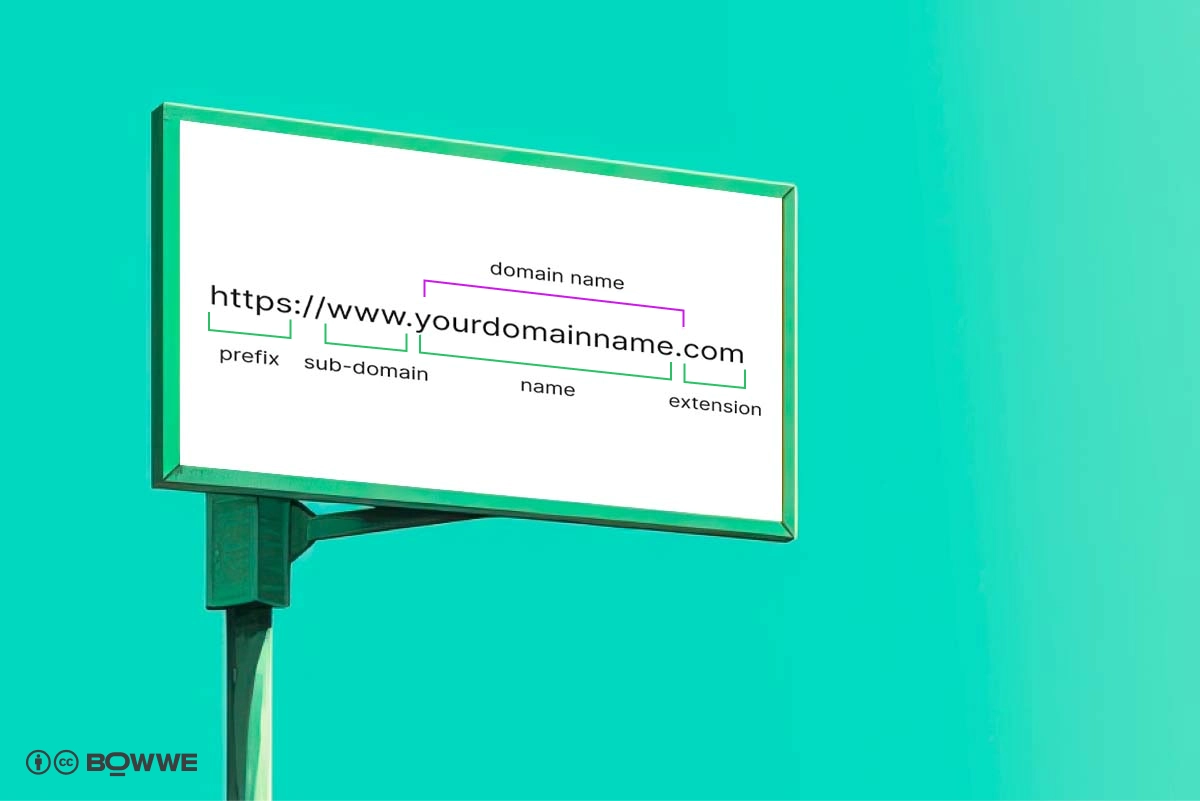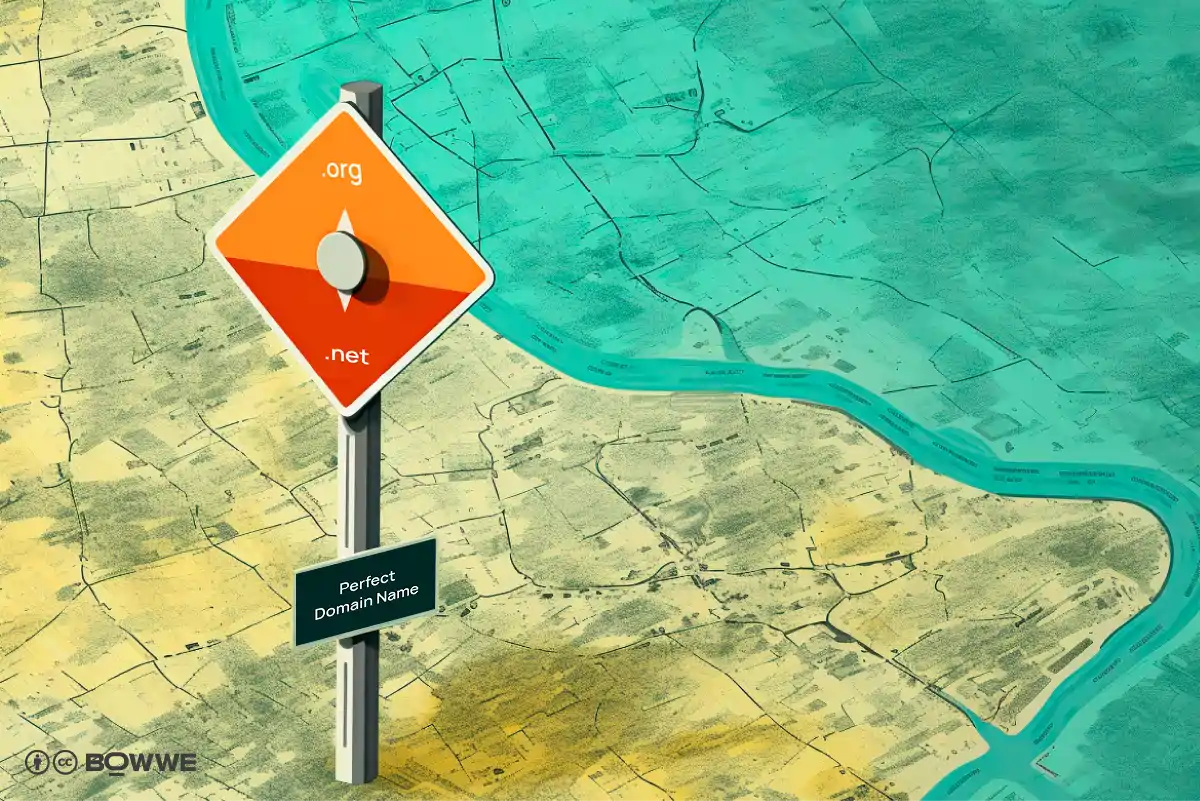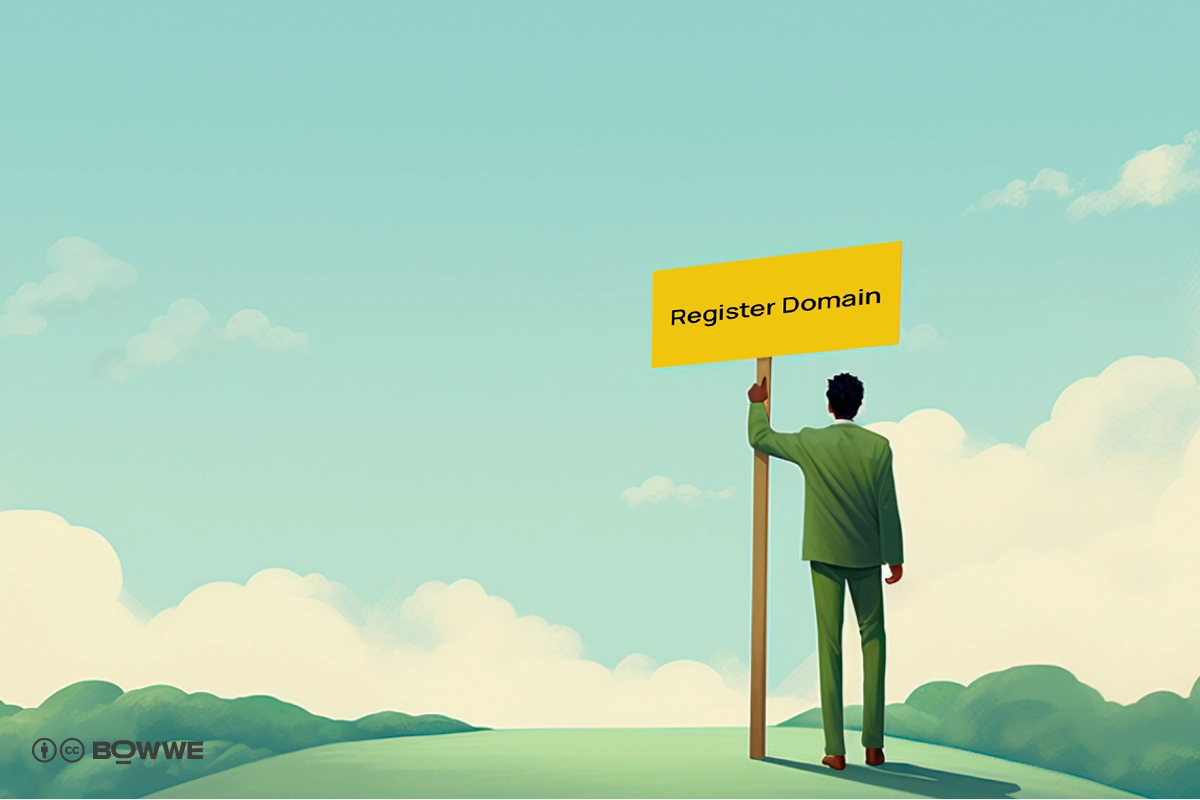Embarking on the journey of establishing an online presence begins with the pivotal step of selecting a domain name. This digital address is the first handshake with your audience, laying the foundation of their impression about your brand. Perfect domain name should resonate with your brand's essence, be easy to recall, and effortless to spell out. Moreover, the domain name you desire should be available and free from any trademark entanglements. Dive into this guide that will help you choose the perfect domain name that will put your website on the path to success 💯
What is a domain name?
A domain name is essentially your online address where internet users can access your website. It's a string of characters that directs people to your website, much like how a street address directs people to your home. But a domain name is more than just a technical shortcut. Like the sign outside a restaurant, it's the first hint of what awaits inside, the first narrative of your brand's story.

At its core, a domain name comprises two elements: the website name and the domain extension. The website name, often your business name or a variation of it, is followed by a domain extension such as .com, .net, .org, among others. For instance, in the domain name "bowwe.com", "bowwe" is the website name, and ".com" is the domain extension. This combination helps in creating a unique identity in the digital expanse, akin to a thumbprint in the human populace.
The domain name is integral to the operation of the internet. It replaces IP addresses, which are strings of numbers that are tough to remember, with easy-to-recall words and phrases. This simplification is a cornerstone of user-friendly web navigation. By typing an easy-to-remember domain name, users are spared the cumbersome task of memorizing numerical IP addresses, making their journey towards your website straightforward and pleasant.
Why do you need a domain name?
A domain name is essential for several reasons:
- Identity: It's like your online name that helps people find you among countless others on the internet.
- Professionalism: Having a domain name shows you're serious about your brand and helps build trust with visitors.
- SEO: A good domain name can help improve your website's ranking on search engine results, making it easier for people to find you.
- Custom email: With a domain, you can have custom email addresses (like yourname@yourdomain.com) which looks professional and is easy for others to remember.
- Marketing: A catchy domain name is easier to advertise and share, helping draw more visitors to your site.
- Growth: A domain name can grow with your brand, even if you expand into new areas.
- Technical ease: On the technical side, domain names replace complex numerical internet addresses with simple, memorable names, making the internet easier to use.
🎯How to choose a domain name? + Bonus tips

1. Reflect your brand
Your domain name should tell people about your brand. It's like your business's introduction, so it should match what you do or offer. Think about what makes your brand special and who you want to reach. Using words related to your business can help make your domain name more relevant and easy to remember.
2. Keep it short and memorable
3. Make it easy to pronounce and spell
Your domain name should be easy to say and spell. This makes it easy to share, whether it's over the phone or in person. Avoid words that are hard to spell or pronounce, as it could lead to confusion and make it harder for people to find your website. Stick to common and familiar words so your audience can easily remember and share your domain name.
START NOW

4. Don’t use hyphens and numbers
It's best to avoid hyphens and numbers in your domain name as they can be confusing. They're often misheard or mistyped, which could lead people to the wrong site. However, if your brand name already includes numbers, you don't need to change it. In such cases, numbers can remain a part of your domain name to keep consistency with your brand identity. Still, for a new domain, sticking to letters only is a clear and easily shareable choice.
5. Don’t be afraid to be creative
A unique and creative domain name can help capture attention amidst a sea of common and overused names. Avoid picking generic terms or phrases widely used in your industry, as they can easily get lost in the crowd. Instead, strive for a domain name that embodies what's special about your brand, something that sparks interest or curiosity at first glance.
Consider playing with words, exploring puns, or even coining a new term. Creativity not only helps in carving out a distinct identity but also in fostering a lasting impression. It could be a clever play on words, an intriguing combination of terms, or even a newly minted word that encapsulates your brand's essence.
Also - while being creative is important, don't stretch too far to be different. Your domain name should still be easy to remember and find online. Balancing creativity with simplicity and memorability is key to choosing the perfect domain name.
6. Remember about keywords and SEO
Including relevant keywords in your domain name can boost your website's visibility on search engines. For instance, if you run a flower shop, having this exact match in your domain name could help rank higher for searches like "flower shop”, especially if you will add localization to it like “flower shop Chicago”.
However, balance is key. While keywords can help with SEO, your domain name should still be catchy and easy to remember. Avoid making it too long or hard to spell.
Also, consider the competition around the keywords you want to use. Highly competitive keywords might make it tough to rank well in search results. Aim for a blend of relevant keywords and a unique domain name to achieve the best of both worlds.
Hack Competitors' SEO Strategy - Full Guide
7. Pick the right extension

The domain extension, the part after the dot like .com, .net, or .org, is crucial for your domain name. While .com is the most recognized and often recommended, other extensions might fit your brand better.
For example, .org could be more suited for non-profits, while tech companies might find .tech or .io appealing. If your audience is mainly local, country-specific extensions like .co.uk or .de can help.
However, finding a .com that matches your brand is getting tougher due to high demand. If you opt for a less common extension, make sure to promote it well, so people remember it. Your choice should align with your brand and audience, and it might be worth getting advice from domain or marketing experts to choose wisely.
8. Steer clear of copyright and trademark issues
When picking a domain name, it's vital to avoid stepping on legal toes by infringing on copyrights or trademarks, as this could lead to expensive legal issues and harm your brand's reputation.
Before settling on a domain name, ensure it's not already trademarked or copyrighted. You can perform a search on your country's trademark and patent office website or consult with a trademark attorney. It's wise to check internationally too, especially in markets you plan to operate in, to avoid any legal issues down the line.
It's also smart to avoid names similar to well-known brands to prevent confusing users or facing trademark claims. Aim for a unique domain name that won’t be mixed up with other brands, and be thorough in your research to ensure it's free from legal hurdles.
9. Check domain name availability
The process is simple. Head to a domain registrar or hosting provider like GoDaddy, Namecheap, or Bluehost. Once there, you'll find a search bar where you can enter your desired domain name. With a quick search, you'll know if the name is available or already taken. This step ensures you find a unique name that represents your brand well in the digital space.
💡How to check availability of domain name?
First, head to a domain registrar like GoDaddy, Namecheap, or Bluehost. Type in your desired domain name in their search bar to see if it's available.
If your preferred domain name is taken, you might need to be creative. Mix in your brand name, relevant keywords, or unique identifiers to come up with alternatives.
If the domain name is unavailable, the registrar might suggest other extensions or variations. Review these suggestions as they might still fit well with your brand while maintaining a professional look.
Once you have some options, use domain availability checkers to confirm they're free to register. Also, check if matching social media handles are available on platforms like Facebook, Instagram, and Twitter, as consistent naming helps with brand recognition.
10. Register your preferred choice

How to register a domain name? Start the registration process on the registrar's website and fill out the necessary information, including your contact details and how long you want to register the domain for. Double-check all the details to avoid any errors.
After finishing the registration and making the payment, you've successfully secured your domain name. Well done! It might take a little while for the registration to spread across the internet, so give it some time before launching your website with your new domain.
💡How much does a domain name cost?
Registering a domain name requires an annual fee, which can differ based on the registrar, the domain extension, and any additional services you opt for. Commonly, domain names cost anywhere between $10 to $20 per year, but premium or highly sought-after domains can cost significantly more. If your chosen domain name is easy to spell, short, and uses a popular extension like .com, it might fall on the higher end of the price range or be categorized as a premium domain with a higher price tag.
Multi-year registration can often come with a discount and ensures that your domain name remains yours for a longer period, reducing the hassle of annual renewals. It also prevents others from registering your chosen domain name once your registration expires. By securing your domain for multiple years, you not only save a bit but also ensure a stable online identity for your brand.
🎁Bonus tip: Think long term
When choosing a domain name, envision where you see your business in the future. Your domain is an investment in your brand's digital identity, so pick a name that will grow with you. Avoid names that limit your business to a specific location or niche unless they are core to your brand. As your business evolves, you want a domain name that remains relevant and continues to fit your brand.
Changing a domain name later can be a cumbersome process and may negatively impact your brand recognition and SEO rankings. It could confuse your existing customers and require a significant effort in rebranding and redirecting traffic to your new domain. Hence, thinking long-term and choosing a versatile domain name from the outset is crucial for your online success.
💡How to change domain name?
Changing a domain name begins with selecting and registering a new one that suits your brand. Before making changes, back up your website to prevent data loss. Update your Domain Name System (DNS) settings to point to the new domain and set up 301 redirects from the old domain to the new one to maintain SEO rankings. Update internal links, logos, and SEO settings on your website to reflect the new domain. Inform stakeholders and customers about the change through emails and social media. Post-transition, monitor your website for any issues like broken links or incorrect redirects. Lastly, keep the old domain registered for a while to ensure all traffic redirects correctly to the new domain.
🎁Bonus tip: Check the domain history
Before settling on a domain name, it's wise to peek into its history to ensure it carries no baggage that could potentially affect your brand negatively. Here’s what to look into:
- Backlink profile: A domain's backlink profile can provide insight into its past usage and reputation. Quality backlinks can be beneficial for SEO, while spammy backlinks can harm it.
- Age: A domain's age can sometimes reflect its credibility and ranking on search engines. Older domains may have a longer history which could either be beneficial or detrimental depending on its past usage.
- Traffic: Check the traffic history to understand its previous and current popularity. This can also indicate any potential issues, like drastic traffic drops which might be due to penalties.
- SEO performance: Assessing the SEO performance can provide a glimpse into its visibility on search engines. Look for any penalties, and how well it ranks for relevant keywords.
- Security: Check for any past security issues like malware infections or phishing activities associated with the domain. A clean security history is ideal for a fresh start.
💡How to check domain history?
Use tools like Ahrefs or SEMrush to inspect the backlink profile,traffic and related SEO issues. Websites like WHOIS or DomainTools can provide information on the age of a domain, showing when it was first registered, while security tools like Sucuri SiteCheck can help identify past malware infections.
🎁Bonus tip: Protect your brand
Securing your brand online goes beyond just registering a domain name. It's wise to also register various versions of your domain name, covering common misspellings or alternative extensions like .net or .org. This step prevents competitors or malicious actors from exploiting similarities to your brand's domain. By doing so, you create a safety net around your brand, ensuring that your audience reaches the right destination online. This proactive measure is a simple yet effective way to uphold your brand's reputation and safeguard your online identity.
🎁Bonus tip: Renew your domain on time
🎁Bonus tip: Fortify your domain with security measures
Invest in securing your domain to build a safe haven for your visitors. Opt for domain privacy to shield your personal information from the public eye. Adding SSL certificates encrypts the data exchange between your site and its visitors, fostering trust and safeguarding sensitive information.
🎁Bonus tip: Monitor domain analytics
It's smart to regularly check how your domain is doing using tools like Google Analytics 4. This helps you see how much traffic your website gets, how visitors behave, and if they're doing what you'd like them to do, like making purchases. By understanding how your online space is performing, you can make informed decisions to improve and grow your online presence. Simple, regular checks can provide valuable insights to ensure your domain is not just a name, but a thriving digital destination.
In BOWWE, you have the advantage of accessing internal statistics for your domain, providing a more current snapshot compared to other platforms like Google Analytics 4. With just a few clicks, you can delve into the current status of your domain, understanding the volume of traffic it attracts and identifying the sources driving this traffic. This real-time analysis empowers you with actionable insights, making it easier to steer your online presence towards the desired goals.
How to find domain name ideas?
Finding a catchy and memorable domain name might feel like a challenge, but there are tools designed to spark your creativity and guide you. Domain name generators like NameMesh are great resources. You input keywords related to your business, and they churn out a variety of domain name suggestions, playing around with word combinations and different domain extensions to provide you a list of available options.
On the tech-savvier side, AI tools like ChatGPT can also be leveraged for domain name brainstorming. By providing some keywords or describing your business, these AI tools can offer a range of creative and unique domain name suggestions. They operate on advanced algorithms and large datasets, enabling them to generate diverse and sometimes unexpected yet catchy domain name ideas.
Between intuitive domain name generators and the power of AI, you have a toolkit to venture beyond the obvious choices and discover a domain name that resonates with your brand's essence and stands out in the digital crowd.
How to find a domain name - summary
Picking the right domain name is a big step in starting your online journey. In this post, we went through everything from brainstorming cool domain name ideas to checking if they're available, along with some expert advice to help you make a great choice. Remember, a good domain name is like a welcome mat for your website and brand, so take your time, have fun with it, and consider the tips we shared. Good luck in finding that perfect domain name that will grab your audience's attention and help make your online adventure a success!

Karol is a serial entrepreneur, e-commerce speaker m.in for the World Bank, and founder of 3 startups, as part of which he has advised several hundred companies. He was also responsible for projects of the largest financial institutions in Europe, with the smallest project being worth over €50 million.
He has two master's degrees, one in Computer Science and the other in Marketing Management, obtained during his studies in Poland and Portugal. He gained experience in Silicon Valley and while running companies in many countries, including Poland, Portugal, the United States, and Great Britain. For over ten years, he has been helping startups, financial institutions, small and medium-sized enterprises to improve their functioning through digitization.







